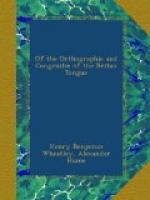2. Cicero, in his buik de Oratore ad Brutum, makes it a natural harmonie that everie word pronunced be the mouth of man have one acute syllab, and that never farther from the end then the third syllab, quhilk the grammareanes cales to the same end the antepenult. Quhilk observation of so noble a wit is most true in tongues q_uhi_lk he understud, the greek and latin. But if Cicero had understud our tongue, he sould have hard the accent in the fourth syllab from the end; as in m{a’}trimonie, p{a’}trimonie, v{a’}dimonie, int{o’}llerable, int{e’}lligences, and whole garrisones of lyke liverie. This anie eare may if he accent the antepenult matr{i’}monie, or the penult matrim{o’}nie, or the last as matrimon{i’}e.
3. Then to the purpose we have the same accentes q_uhi_lk the latin and the greek hath, acute, circu_m_flex, and grave.
4. The acute raiseth the syllab quheron it sittes; as prof{e’}sse, pr{o’}fit, {i’}mpudent.
5. It may possesse the last syllab: as suppr{e’}st, pret{e’}nce, sinc{e’}re; the penult: as s{u’}bject, c{a’}ndle, cr{a’}ftie; the antepenult: as diff{i’}cultie, m{i’}ister, f{i’}nallie; and the fourth also from the end, as is said sect. 2; as sp{e’}ciallie, ins{a’}tiable, d{i’}ligentlie. In al q_uhi_lk, if a man change the acce_n_t, he sall spill the sound of the word.
6. The grave accent is never noated, but onelie understood in al syllabes quherin the acute and circumflex is not. Onlie, for difference, sum wordes ar marked with it, thus `, leaning contrarie to the acute.
7. The circumflex accent both liftes and felles the syllab that it possesseth, and combynes the markes of other tuae, thus ^. Of this we, as the latines, hes almost no use. But the south hath great use of it, and in that their dialect differes more from our’s then in other soundes or symboles.
8. The use of the accent wil be of good importance for the right pronu_n_ciation of our tongue, quhilk now we doe forte, non arte, and conforming of the dialectes, q_uhi_lk, as I have said, differes most in this.
OF THE APOSTROPHUS AND HYPHEN.
Cap. 10.
1. The learned printeres uses to symboliz apostrophus and hyphen as wel as a, b, c.
2. Apostrophus is the ejecting of a letter or a syllab out of one word or out betuene tuae, and is alwayes marked above the lyne, as it wer a com_m_a, thus ’.
3. Out of one word the apostrophus is most usual in poesie; as Ps. 73, v. 3, for quhen I sau such foolish men, I grug’d, and did disdain; and v. 19, They are destroy’d, dispatch’d, consum’d.
4. Betuene tuae wordes we abate either from the end of the former or the beginni_n_g of the later.
5. We abate from the end of the former quhen it endes in a voual and the next beginnes at a voual; as, th’ ingrate; th’ one parte; I s’ it, for I see it.
6. In abating from the word following, we, in the north, use a mervelouse libertie; as, he’s a wyse man, for he is a wyse man; I’l meet with him, for I wil meet with him; a ship ’l of fooles, for a ship ful of fooles; and this we use in our com_m_on language. And q_uhil_k is stranger, we manie tymes cut of the end of the word; as, he’s tel the, for he sal tel the.




